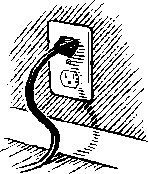There is an article (http://www.physorg.com/news154288469.html) encouraging the use of electric charging stations in San Francisco as a way of cleaning up inner city air. My first thought is that I spend time in San Francisco occasionally and I find the city to be very clean, without any intrusion on my senses. Moreover, I work in New York City each day and I have spent my entire life in that city, having been born, raised and employed there and no where else. NYC is light years better in terms of air quality than it was when I was a boy.
But let's look at electric cars realistically. From the standpoint of efficiency, they're not better than the traditional internal combustion engine. Each car must be charged with electricity generated at a central station power plant. The average steam electric generating station in the U.S. is about 33% efficient. So two thirds of the energy used to generate a Kilowatt-hour is gone before it leaves the plant. In addition, losses on the transmission and distribution system (the wires that carry power) amount to up to 10% and the drive train of the vehicle, motors, electric power quality, etc. will likely reduce efficiency by a similar amount. Those additional reduction in efficiency, another 20%, reduces the electric car efficiency to around 26%. This is not much better than the internal combustion engine.
One can argue that we are reducing pollution. But are we? Or are we really displacing pollution. Every fossil-fuel burning power plant emits pollution of various kinds and amounts depending on the fuel used. What we do not endure from a tail pipe we still endure from a power plant stack. One can also argue that it's easier to control pollution from thousands of power plants rather than millions of cars and with that I agree. But is displacing the emissions from your vehicles to another community for the sake of your own air really fair?
Before the U.S. embarks on an all out electric car phase, the amount of infrastructure both in terms of power plants and millions, tens of millions, of charging stations should be examined very, very carefully. There has to be a benefit associated with the huge cost, not just the illusion of pollution reduction. Plus, if there's a black out, especially an extended one like the 2003 blackout of a large swath of the U.S., how will cars be charged? Is this potentially a national security issue?
There is a better way at this. One that is more efficient and ultimately pollution free. But that's for a future blog post.
Subscribe to:
Post Comments (Atom)




No comments:
Post a Comment